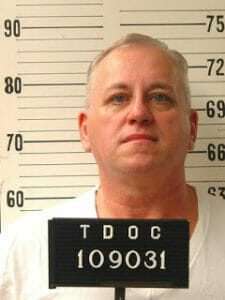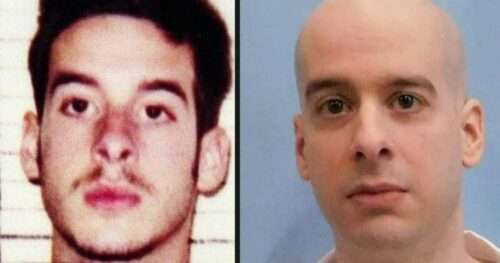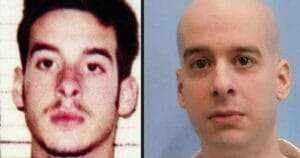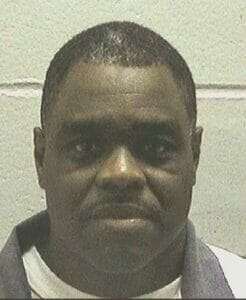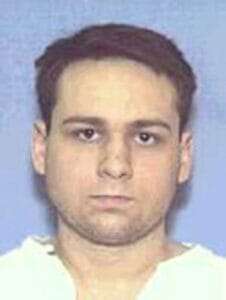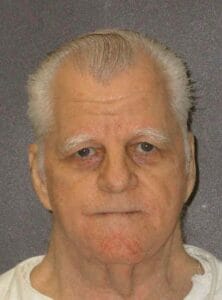Michael Samra was executed by the State of Alabama for multiple murders. According to court documents Michael Samra and Mark Duke would murder Randy Duke, his fiancée Dedra Mims Hunt, and her two daughters, 6-year-old Chelisa Nicole Hunt and 7-year-old Chelsea Marie Hunt. Michael Samra who was 19 at the time was sentenced to death. Mark Duke was sixteen and sentenced to life without parole, Michael Samra would be executed by lethal injection on May 16, 2019
Michael Samra More News
An Alabama Death Row inmate was executed by lethal injection Thursday night, more than 22 years after the quadruple slaying of a family in Pelham.
Michael Brandon Samra, 42, was executed at William C. Holman Correctional Facility in Atmore. The Alabama Supreme Court set his execution date in April.
Samra was 19 when he and his co-defendant, then 16-year-old Mark Anthony Duke, were charged with killing Mark Duke’s father Randy Duke, his fiancée Dedra Mims Hunt, and her two daughters, 6-year-old Chelisa Nicole Hunt and 7-year-old Chelsea Marie Hunt. Samra was convicted of capital murder in 1998 after confessing, and was sentenced to death for his role in the killings.
The curtains opened to the execution chamber at approximately 7:09 p.m. When approached by the warden, Samra smiled.
His last words were a prayer. “I would like to thank Jesus for everything he’s done for me,” he said. “I want to thank Jesus for shedding his blood for my sins. Thank you for your grace Jesus, amen.”
Samra lied on the gurney with his eyes open, facing the witness room that contained his two attorneys, his spiritual adviser, and members of the media. At 7:14 p.m., his eyes closed.
One minute later, his chest heaved three times. His breathing appeared labored for several minutes.
Samra did not respond to a consciousness check, performed by a corrections officer at 7:17 p.m. Two minutes later, he stretched both hands and slightly raised his left arm, then curled his fingers and dropped his arm.
The curtain to the chamber closed at 7:26 p.m. The official time of death was 7:33 p.m., according to prison officials.
Samra’s attorneys appealed to the U.S. Supreme Court, arguing his age at the time of the 1997 slaying should prohibit him from being executed, but the nation’s highest court ruled Tuesday they would not review the case and would not stay Samra’s execution.
Gov. Kay Ivey also refused a reprieve for Samra, the prisoner’s lawyer said. One of his attorneys, Steven Sears, said he received the denial from Ivey’s office about eight hours before the execution.
Following the execution, Ivey released a statement: “For more than 20 years, the loved ones of Randy, Dedra and the two young daughters Chelisa and Chelsea have mourned an unbearable and unimaginable loss. Four lives were brutally taken far too soon because of the malicious, intentional and planned-out murders by Michael Brandon Samra.
“Alabama will not stand for the loss of life in our state, and with this heinous crime, we must respond with punishment. These four victims deserved a future, and Mr. Samra took that opportunity away from them and did so with no sense of remorse. This evening justice has been delivered to the loved ones of these victims, and it signals that Alabama does not tolerate murderous acts of any nature.
“After careful consideration of the horrendous nature of the crime, the jury’s decision and all factors surrounding the case, the state of Alabama carried out Mr. Samra’s sentence this evening. Although this can never recover the lives lost, I pray that their loved ones can finally find a sense of peace.”
Alabama Attorney General Steve Marshall issued a statement following the execution, detailing the crime. He added, “Randy Duke was shot in the head. Dedra Hunt was shot multiple times as she attempted to flee with one of her daughters. Samra and Duke then proceeded to kill both of the young girls, cutting their throats. Samra was convicted of capital murder in 1998 and received his just punishment: a sentence of death. After too many years of delay, justice has finally been served. Tonight, we pray for the victims and for their families, that they might find peace and closure.”
Alabama Department of Corrections Commissioner Jeff Dunn spoke after the execution and read a statement from the Mims and Hunt family. “This has been a painful journey. Today justice has been carried out,” it said. The statement also included thanks for all police and investigative agencies who worked on the case. “We ask that you keep all families involved in your prayers,” the statement said.
Dunn did not give any reasons for the hour delay, and said to his knowledge there were no problems preparing the inmate for the procedure.
Wednesday, Samra was visited by six friends, two attorneys, and his spiritual adviser. He also made a phone call to his father. Thursday, he was again visited by six friends and his spiritual adviser.
Samra did not eat breakfast Thursday and did not request a last meal. He did not have any special requests.
Six witnesses from the victims’ families witnessed the execution, along with two attorneys from the Alabama Attorney General’s Office
According to court records filed by the Alabama Attorney General’s Office to the U.S. Supreme Court, Mark Duke and Samra brought two guns to Randy Duke’s home on March 22, 1997, where the teenagers planned to kill everyone inside.
Mark Duke fatally shot his 39-year-old father in the head, while Samra shot Hunt in the face. Although injured, 29-year-old Hunt fled upstairs with her daughters. Hunt and Chelisa sought shelter in an upstairs bathroom, while Chelsea hid under a bed.
Samra and Mark Duke ran after them, and Mark Duke shot and killed Hunt after he kicked in the bathroom door. Then, out of bullets, Mark Duke got two knives and pulled Chelisa from behind the shower curtain and slit her throat. The teens then pursued Chelsea, who was fighting back from under the bed. As she struggled, Mark Duke held her down and Samra slit her throat.
Mark Duke was also originally sentenced to death, but his sentence was later overturned and changed to life in prison pursuant to a U.S. Supreme Court ruling banning execution for offenders who committed their crimes while they were juveniles. He was 16 at the time of the slaying.
According to court records, Mark Duke came up with the murder plot because Randy Duke refused to allow him to use a pickup truck. He was called the “mastermind” of the plot.
Samra’s attorneys, Sears and Alan Freedman, have argued in court filings that the Eighth Amendment bans the execution of offenders- like Samra- who were under the age of 21 at the time of their crimes.
In 2005, the U.S. Supreme Court banned execution for people who were under the age of 18 at the time of their crimes. Sears has said this ruling should be modified due to “evolving standards of decency.”
In his U.S. Supreme Court petition, Samra’s attorneys argue the 2005 rule should be extended to include offenders up to the age of 21 at the time of their crimes. “The mitigating qualities of youth do not dissipate the day a youthful offender turns 18 years old,” the petition states. “Since [the 2005 decision], scientific studies have shown that during a person’s late teens and early 20’s, the brain continues growing and undergoes rapid changes in self-regulation and higher-order cognition.”
Last week, Sears sent a letter to Ivey asking for a reprieve until another state’s supreme court can decide whether offenders who committed their crimes under the age of 21 should be eligible for the death penalty.
Sears wrote in the letter, “The question of whether the U.S. Constitution permits the execution of 18-to-21-year-old offenders is percolating in the courts and is currently pending in the Kentucky Supreme Court. The Kentucky case arose after a trial court judge ruled that the reasoning supporting the U.S. Constitution’s ban on executing juvenile offenders extends to those over the age of 21. To prevent a miscarriage of justice and ensure that Alabama does not carry out an unconstitutional execution, Samra respectfully requests a reprieve until the Kentucky Supreme Court has ruled on the question that would determine whether Samra is categorically eligible for the death penalty.”
The U.S. Supreme Court petition also mentions the Kentucky case and states, “Also, there is a burgeoning national consensus against executing young adult offenders. Since [the 2005 ruling] was decided, only 13 states have handed down 4 new death sentences to offenders under 21, and a majority of states, 30, would not permit the execution of a youthful offender. Notably, one Kentucky court, surveying the scientific research and national consensus, has concluded that Eighth Amendment line drawn in Roper must now be drawn at 21.”
“In the 14 years since this Court decided [case law], society’s standards have evolved rapidly to the point that the line drawn [in the 2005 case] can no longer be justified. Accordingly, Samra has shown a reasonable likelihood that he will prevail on his Eighth Amendment claim… Before it is too late, this Court should ensure that the Eighth Amendment does not categorically preclude him from receiving the law’s most severe and irreversible penalty.”
“Finally, to the extent that Samra relies on a supposed national consensus against imposing capital punishment on persons who were under the age of twenty-one when they committed capital murder, his claim is meritless. There is no such consensus, which is made most obvious by Samra’s failure to point to a single state that has specifically eliminated the death penalty for defendants who are between the ages of eighteen and twenty-one when they murder their victims,” the Alabama AG’s Office wrote.
“Simply put, Samra’s allegation does not withstand scrutiny. His ‘national consensus’ and ‘clear and growing trend’ are made up out of whole cloth. Rather than citing to any instance in which any state has adopted his position, Samra points to two red herrings… What Samra ignores is that all of the states that fall in these categories still retain the death penalty as a sentencing option for persons who committed capital murder between the ages of eighteen and twenty-one. At bottom, Samra has failed to show a ‘clear and growing trend’ because there is none.”
Samra’s attorneys have also argued that putting Samra to death isn’t just, since the crime’s mastermind Mark Duke is spending his life in prison. Sears called the quadruple slaying a “terrible tragedy,” but said he and his co-counsel “don’t think that killing one more person is going to help.”
“It’s not fair to kill the small fish and let the whale go,” Sears said, referring to Mark Duke’s sentence change. Sears said the fact Samra was several years older than his friend at the time of the slaying has made more of a difference than anything in the case.
The lead investigator on the case at the time, and now the mayor of Helena, Mark Hall said he believes it’s time Samra face his punishment. “I am not surprised by the request for a stay by the offender, but I’m reminded that the innocent victims of these horrific and senseless murders– two adults and two small children– did not have that option on that terrifying night when they were brutally murdered,” Hall wrote in a statement.
“…Convicted murderers, who have exhausted all means of the possibility of acquittal in a capital murder case should serve every day, every hour and every minute of the sentence they were given, and that includes the death penalty when it is imposed.
Those innocent victims, and the families of those victims, deserve no less.”
Two other men, David Collums and Michael Ellison, were convicted of lesser crimes in the case and served time in prison. They have since been released.
Another execution is scheduled Thursday in Tennessee, that of 68-year-old Don Johnson, who was condemned to die for the 1984 suffocation of his wife.
https://www.al.com/news/birmingham/2019/05/michael-samra-convicted-of-killing-4-in-1997-to-be-executed-thursday.html
